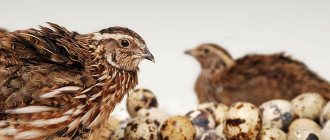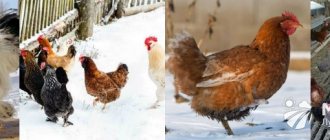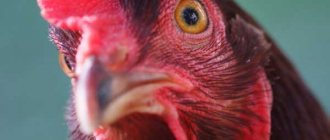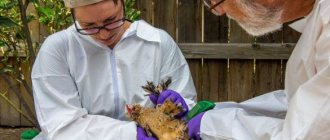Many poultry farmers worry if chickens suddenly stop laying eggs in the fall. Basically, chickens stop laying eggs due to seasonality, diet, breed, type of feed, and age. There can be many reasons why chickens have stopped laying eggs.
Many poultry farmers worry if chickens suddenly stop laying eggs in the fall.
Errors in catering
This is the most popular reason explaining why chickens stopped laying eggs in the summer and also in the fall.
Incorrectly selected food
Often, novice poultry farmers purchase ready-made compounds, but do not take into account the composition of the complexes. It is important to consider the breed of chicken.
In addition, the finished feed should include:
- flax and hemp seeds;
- beans, lentils, peas.
These components help improve egg production and increase chicken productivity. Calcium should be present in the diet. Its deficiency is the main reason for decreased egg production. Also, a deficiency of the mineral causes pecking - in order to cover the deficiency, birds eat the shells of their own eggs. To normalize the finished feed, birds are additionally given chalk or crushed shell rock. It is also advisable to enrich the laying hen’s diet with fresh herbs, which contain a large amount of vitamins and minerals.
There are cases when the feed is selected correctly, but the chickens do not lay eggs, what should I do? In this case, you need to prepare wet mash for them.
Errors in feed preparation
It is better to give compound feed to the bird in a slightly moistened form: this way it is better absorbed by its digestive tract. Poultry farmers often make mistakes in preparing mash. Carrots, pumpkin, and beets are good for poultry health. However, you cannot add potato peelings, baked goods or rotten vegetables to the mash. You can include potatoes from time to time, but only boiled ones. We will allow white bread from flour products. Spoiled vegetables can lead to gastrointestinal diseases.
Violation of feeding regime
Laying hens should not be overfed or underfed. In both cases there will be a decrease in their ability to lay eggs due to obesity or lack of nutrients. The birds are fed three times a day. Compound feed is given at every meal, and at lunch the diet is enriched with mash.
Serving size: 125 grams per person.
Lack of fluid
Lack of water in the body greatly affects the egg production of chickens. If a bird is constantly thirsty, then its body begins to malfunction, which leads to the fact that the hens become unable to lay eggs.
For an adult young bird, 200 ml of water is needed at each meal.
Preventive measures
To ensure an annual income from a chicken, prevent it from getting sick, and avoid a decrease or absence of egg production, you need to know what preventive measures to apply.
Preventive actions:
- balanced diet (vitamins, fats, carbohydrates);
- addition of nutrients to feed;
- food supplement of vitamins A, B, E, C and D;
- frequent replacement of drinking water;
- improving living conditions in the chicken coop.
It is also necessary to have a first aid kit, which should include potassium permanganate, sorbent, antibacterial agent, disinfectants, vitamins, etc.
Chicken eggs are included in the diet of most people in the world. To constantly receive them from a chicken, you need to take care in its maintenance, creating comfortable conditions for the bird at any time of the year.
Errors in content
The answer to the question: “Why did the chickens stop laying eggs in the fall - what is the reason?” lies in maintenance errors. Next, we will consider the main factors that affect the productivity of poultry.
House temperature
Comfortable temperature range: +12-18 degrees. In winter, a heater is installed in the poultry house. In summer, it is useful for birds to be in the fresh air, which is why they organize a walk for them. If any condition is violated, there is a high risk of decreased egg production.
Humidity
The optimal value of the indicator is 60-75 degrees. Humidity is the most important condition for keeping chickens. If the humidity is higher, there is a high probability of a flu epidemic, while low humidity causes infection with the feather eater - a parasite that eats bird feathers.
Lighting
The duration of summer daylight for laying hens is 12-14 hours. Therefore, in winter, when the natural length of the day is shorter, artificial lighting devices, for example, ultraviolet lamps, are turned on in the poultry house; they additionally help to heat the room.
Crowding in the poultry house
A large number of birds in one chicken coop is prone to outbreaks of various diseases. In such conditions, it is more difficult to maintain optimal temperature and humidity in the room, which will negatively affect the process of egg production.
Lack of rooster
Having a male indoors reduces stress levels in hens, which has a positive effect on their productivity.
Feeding
The main things to pay attention to:
- sufficient amount of feed per head;
- sufficient feeding front (so that some do not take food from others);
- good quality feed - feeding moldy, rotten feed is not allowed;
- protein content at 15-17%;
- the food must be filled with a sufficient amount of energy (carbohydrates, fats).
You can read more about balanced feeding in our article.
Feed distribution should be carried out at least twice a day. The first feeding is done after turning on the light, the second - about 6 hours before bedtime or 8-10 hours after the first.
If there is a lack of protein, the egg production of chickens will drop sharply, and if replenished, it will increase. Sometimes in a poultry house you can observe a false decrease in egg production - “casting” of eggs. This happens when there is a lack of calcium, when a chicken lays an egg without a shell, and it is lost on the litter or eaten by the bird.
A sharp drop in productivity may occur due to lack of water. It is better to give laying hens plenty of water, but you can also resort to dosed watering. In this option, water is given simultaneously with food.
They make sure that there is enough for all the chickens, and also pay attention to the quality of the water - it must meet drinking standards
Internal factors
These include several criteria for decreased productivity.
Bird age
The most productive are young chickens under 2 years of age; gradually the bird begins to stop laying eggs. At the age of 5 years, laying hens are practically useless.
Stress
Birds, like people, can experience stress. A negative situation can cause chickens to stop laying eggs at the same time.
The main factors that cause chickens to worry are:
- changing the chicken coop;
- change in feed;
- taking antibiotics or other medications.
Shedding period
An adult bird moults once a year in autumn. How long does it take for chickens to molt? On average, 1.5-2 months, during this period egg production comes to naught.
Some poultry farmers decide to speed up the molting of laying hens by creating extreme conditions for them. This could be a week-long hunger strike, lack of lighting for the same period. Such stress methods can only be used with completely healthy birds over 5 months of age.
Diseases
Any health problems such as ticks, periodontal beetle, influenza, helminthiasis will negatively affect the productivity of laying hens. It is important to cure the bird in time, otherwise it will not only lay eggs poorly, but may also die, having previously infected its “neighbors”.
Hatching chicks
In spring and summer, the brooding instinct appears. If obtaining offspring is not part of the poultry farmer’s plans, the chicken is isolated for several days, provided with normal food and water. This will help resolve the problem.
Predators
Often ferrets, martens, foxes and weasels raid the nearest poultry house. The smell of a predator is a strong stress for the bird; because of it, egg production drops. Special traps and traps and ultrasonic repellers will help to secure the farm.
Parasites and their control
Parasites affect poultry at any age. They can be external or internal.
Poultry is more likely to get sick from infection or parasite infestation
External ones include lice and lice. These are insects that parasitize the skin. Because of pests, birds lose their feathers, become restless and stop laying eggs. With a strong invasion, the chickens turn pale and die.
To get rid of insects, birds and the chicken coop are treated with special antiseptics. Before doing this, thoroughly clean the chicken coop from accumulated dirt.
No less dangerous are internal parasites - worms. To get rid of them, special anthelmintic drugs are used, diluted in water or given to each chicken in its beak.
How to increase your score
There are several ways to deal with the problem. Here are the tips:
- When compiling a diet, take into account the age of the bird, provide it with the necessary amount of calcium and other minerals. This will help speed up the egg production process.
- Drinkers should always be full of clean water.
- Regular vitamin supplements are required.
- Provide the feathered population with decent maintenance. The chicken coop should be well ventilated and lit. In winter, it is advisable to consider insulation.
Treatment of the disease
Histomoniasis in turkey poults: symptoms and treatment
If a disease such as cloacitis is detected in chickens, treatment should begin immediately. If there is white discharge from the cloaca of a chicken, do the following:
- Quarantine sick individuals.
- Clean and rinse the cloaca area with clean water with the addition of any disinfectant - manganese or furatsilin.
- For inflammation of the cloaca in chickens, treatment begins with topical application of iodine-containing drugs and antiseptics, such as Rivanol, Levomekol, Tetramycin, ASD-3 or zinc ointment. You can use a solution of the folk remedy mumiyo.
- Use general antibiotics such as Avidox or Dorin, or intestinal antibiotics Amoxicillin. The dosage must be prescribed by a veterinarian or you can determine it yourself according to the instructions included with the drug, taking into account the weight of the bird.
- Carry out immediate disinfection and cleaning using a disinfectant in all premises where poultry are kept.
- Adjust poultry feed, or replace it altogether, introduce vitamin and mineral complexes.
Note! The disease will not go away on its own and if emergency measures are not taken, mass death of livestock is possible
How many eggs can chickens lay?
To determine the reasons, you first need to consider how many eggs birds can lay:
- Meat-egg and outbred individuals, for example, Amroks or Adler - about two hundred annually. But the bird must live in warm conditions.
- Brekel, Leggor or Loman Brown - more than three hundred eggs.
- Meat breed - usually do not show special abilities in egg production, but some representatives can produce about a hundred eggs.
Hatching instinct
The cessation of laying eggs in chickens may be a consequence of the brooding instinct - a behavior that occurs in the spring or summer. Characterized by rarely getting up from the nest, stopping egg laying, and attempts to steal eggs from laying hens. If there are no plans to have chickens, then this can be corrected using a cage in the shape of a cube with sides of 0.7 meters, where a mature “hen” is placed, provided with food and drink, installed in another place on the walking area and after 2-3 days “ conclusions,” the rooster is placed for 48 hours. After this, the birds are released to the livestock in the evening.
The hen loses her maternal instinct when she finds herself in stressful conditions that are created artificially. Various methods are used:
- Pouring with cold water. This reduces the rising temperature for hatching eggs naturally, and the instinct recedes. You can dip the chicken in a container of water.
- Darkness. Without sunlight and in a cool room, maternal feelings quickly weaken.
- Hunger strike. A cruel method, using which the bird is not fed for 2 days and is not walked, because of which it gives up the desire to become a mother.
Age
Egg laying begins at the age of 4-6 months and is most productive until the second year of life, after which it decreases annually by 15-20%. To extend the productive age of birds, some poultry farmers vaccinate them with a special preparation in the spring. But by the 5th year, egg production inevitably drops to an unprofitable level, and nothing can be done about it. When buying livestock, you should take two-week-old chicks or hatching material to avoid becoming a victim of deception about the age of adults.
The reason is stress
When forming a flock, you should immediately think through all the nuances. To avoid the question of what is the reason for the cessation of egg laying, it is necessary to prevent:
- Reformation of the flock during the laying period;
- Changing premises, moving to other chicken coops;
- Changes of service personnel;
- Changing equipment, feeders, drinking bowls;
- Repair of the premises (even preventive).
All of these factors cause stress in the bird. Any of them can affect the fact that the egg will not be received.
Solutions
Naturally, one must start from the reason. If the problem is in the design of the nest itself, you should try to slightly adjust its appearance or create a new one. If we are talking about alterations, it is enough to build something like a roof, then the chickens will not be able to sit on the walls, like on perches, and will sleep on a roost.
If you want to give your chicken coop more functionality and neatness, creating new nests is a great idea. There are many models of closed booths, with amenities not only for laying hens, but also for owners, with an openable roof to simplify cleaning and collecting eggs. There are also those that have a slight slope of the bottom along which the eggs roll, which can save them from being eaten by other birds, especially in winter, when they lack nutrients.
It is important that they are not much above ground level, 30 cm is more than enough. It is advisable to make them like a booth, only for chickens, with a roof.
Firstly, this will remove the temptation for pets to sleep in them and, accordingly, to crap. Secondly, in such structures, laying hens will feel much more comfortable and protected. The calculation of the number of nests should be in the ratio of 1 nest per 5 hens.
If there is not enough space for everyone in the chicken coop, you should try to build additional places and in the evening move the chickens from the nests to the correct position. There is a high probability that they will relearn and get used to it. If you notice that the litter is constantly scattered around the chicken coop and almost does not remain in its place, you should change it to another one. It is better to use cut hay, sawdust and other bedding materials as bedding, which are much more difficult for birds to remove from the nest. You can also try mixing several types, such as straw down for softness and a layer of hay on top.
You can also check in the evenings to see if the roost is suitable for your chickens. Initially, chickens in the wild were forced to hide on tree branches at night
Accordingly, it is very important to create it as comfortable as possible for our chickens. In the event that it is very difficult for them to climb on it or they cannot reach it at all, it is worth lowering the perches or installing them according to the “ladder” principle.
This way, the birds will be able to climb to the height they need.
Chickens may completely ignore the roost and climb into nests if it is too low. The recommended minimum height starts at approximately 1 meter. The remaining perches or bars should be higher, but within reach. The perch itself should be suitable for the size of the chickens' paws and be rounded, without sharp edges, so that the poultry can hold on confidently.
Infectious diseases
Chickens stop laying eggs or reduce egg production due to infections, including streptococcosis, tuberculosis, smallpox, mycoplasmosis, laryngotracheitis. Diseases in adult laying hens sometimes occur latently, without pronounced clinical signs. Sick individuals may wheeze, sneeze, and cough.
A sharp decrease in egg production is observed with infectious bronchitis, which occurs in the reproductive form. It is characterized by an asymptomatic course or minor damage to the respiratory system. The only manifestation of infection is a decrease in egg production from 30 to 80%. At the same time, chickens lay small eggs with a weak shell.
Reduced egg production syndrome (RES-76) is another infectious disease in which chickens do not lay eggs well. Most often found in laying hens aged 8-12 months. The virus causes an inflammatory process in the intestines and oviduct. A sick bird diarrhea, has ruffled plumage and appears depressed. No treatment has been developed for the disease.
In case of infectious diseases, the entire livestock is culled.
Lighting
For good egg production, environmental conditions are important for chickens. The bird should be calm and comfortable. There is light for all living things, chickens are no exception. To prevent productive indicators from falling, the daylight period for chickens should not be less than 15 or at least 12 hours.
Light affects the bird in stages, entering the body through the eyes, it reaches the optic nerve and hypothalamus. Under this influence, certain substances are released that stimulate the hormonal component. And chicken ovaries work under hormonal influence. By the beginning of laying, the duration of daylight hours should be gradually increased from 10 or 12 hours to 15. You cannot increase the duration of light too quickly; there will be no positive result.
When keeping chickens in cages, it is desirable to install fluorescent lamps, but it should not be too dark or clear above the nest. Light shading can be done. Excessively bright lighting will only reduce chicken productivity.
Breed
Among the variety of chicken breeds, there are egg, meat and meat breeds. Some of them lay eggs daily, while others have their own schedule.
When purchasing a chicken, decide on the purpose of keeping it. Thus, egg breeds of chickens lay about 300 eggs per year, but their meat is hard, tasteless, and takes a long time to cook. The meat ones will delight you with wonderful meat, but their egg production is low. Tender meat and egg laying of 200 pieces per year are obtained from meat-egging species. Therefore, cessation of egg production may be normal and a sign of the breed.











